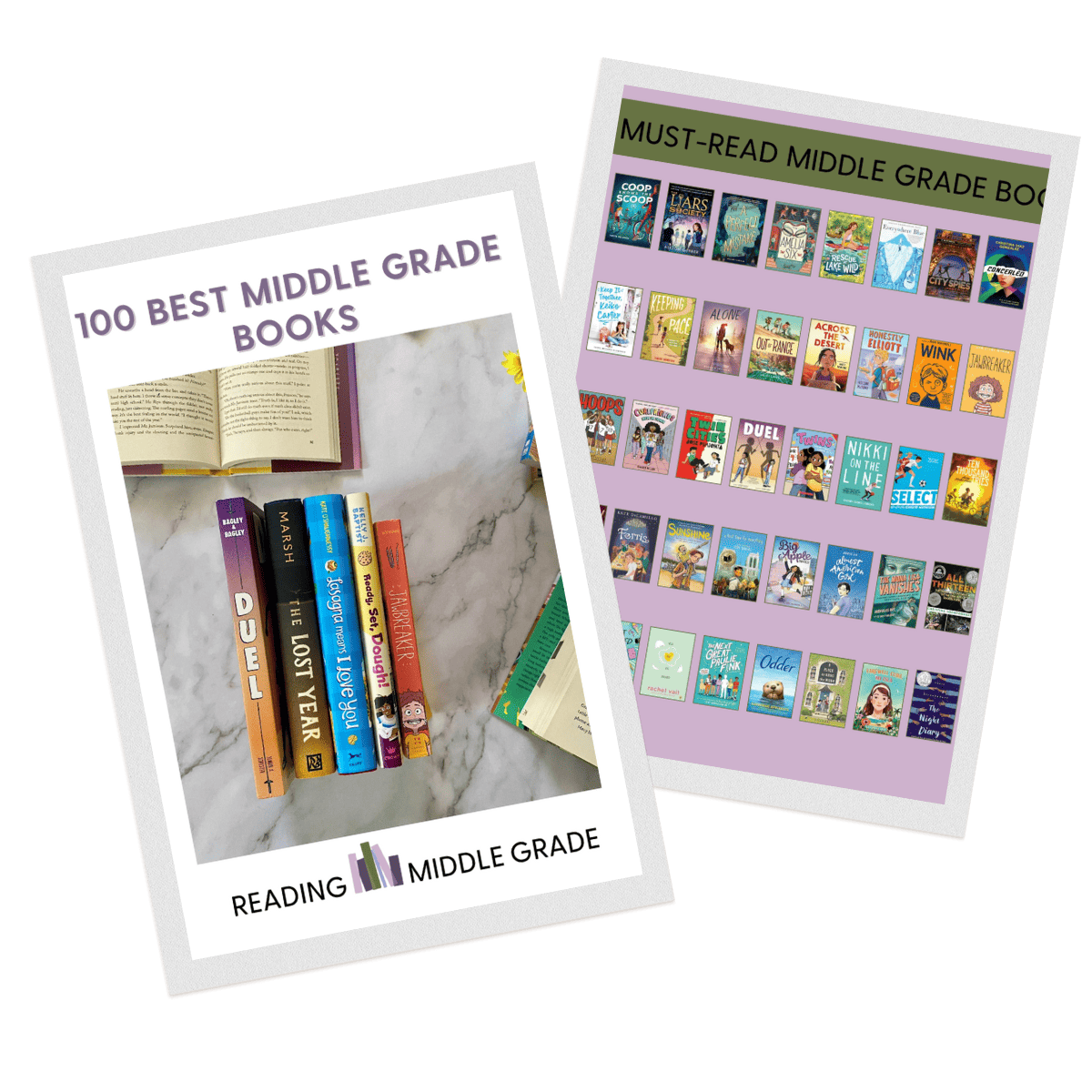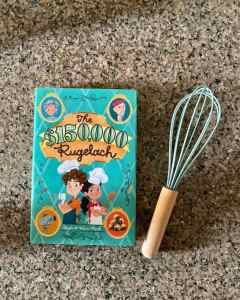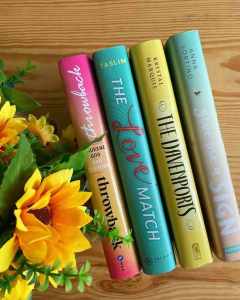My introduction to Saadia Faruqi’s writing was in A Place at the Table, the middle-grade book she co-wrote with Laura Shovan (another author whose writing I love). Saadia’s solo middle-grade debut, A Thousand Questions is out today! It’s a dual perspective story about two girls, Mimi and Sakina, from different backgrounds who meet when Mimi’s mother takes her from the States to Pakistan (where Mimi’s mother is from) for the summer holiday. Mimi is hoping to find her estranged journalist father who is working in Pakistan. Sakina is the family chef’s daughter who desperately wants to go to school, and do more in her life than cook and help out her family financially.
I absolutely loved talking to Saadia about this book, writing about home when home is a third world country, creating two vastly different characters, and of course, Pakistani food in her books. This is one of my favorite interviews I’ve ever done! I learned so much about Saadia, and gained deeper insight into the book. Enjoy!
Author Interview with Saadia Faruqi

Hi Saadia! As you know, I enjoyed reading A Thousand Questions this summer. It was fun and heartwarming following Mimi and Sakina on their adventures in Karachi — and I loved your Author’s Note at the end.
Thank you, I’m so glad you enjoyed the book. I felt like an author’s note was necessary to explain my inspirations for it.
As someone from a “third-world country,” I yearn to see my country portrayed lovingly, but honestly in books, and I think you did that for Karachi. Why did you choose to set your middle-grade solo debut in Karachi, Pakistan?
I agree! Too often we see a very stereotypical depiction of poor countries in books, one that lack dimension and authenticity. When I wrote A Thousand Questions, it was very important for me to showcase my birthplace — Karachi — in all its glory: the good, the bad and the ugly. For me, the setting was obvious. I wanted to explore the conflicted emotions that first generation kids have regarding the countries of their forefathers, and the chasms that exist between them and those living in the homeland. At the same time, I wanted to show readers — especially young readers — that other countries can also be amazing places to live.
My heart ached for Sakina and her family’s hardships, but I admired her love of reading, and her determination to keep trying. Why did you decide to tell her story?
I probably have more in common with Sakina than I do with Mimi. Growing up in Pakistan, my family wasn’t rich. My father kept ill (diabetes, just like Sakina’s Abba) and my mother struggled to provide for us in her teaching job. I went to the best schools, but I felt very poor compared to some of my classmates. I had a lot of insecurities in my youth, and the prickly nature that comes from not having agency. I decided to tell Sakina’s story because I don’t like how poverty is often portrayed extremely negatively in books. I wanted to show Sakina as a girl with hopes and dreams, someone who saw poverty as a part of who she was.
Politics shows up often in this story, and an upcoming election impacts some of the characters. Were those things you intentionally wanted to highlight as part of your story, and why?
As I explain in my Author’s Note in the book, I got the idea for A Thousand Questions during a visit to Karachi with my kids. I watched them interact with their family members and soak in the sounds and smells of their new surroundings. I knew I had to write that down in some form. While we were visiting, Pakistan was actually getting ready for their national elections. In between my writing, I’d stop to listen to a campaign parade passing by with music blaring, or watch political commentary on my mother’s television. It was such a big part of the background noise as I was writing the first draft, that I decided at some point to include it in the book. I think it ended up being an important aspect of the story without distracting readers from the main plot.
Although Sakina’s story is closer to my heart, I enjoyed Mimi’s character as well. As a child, did you enjoy writing like Mimi does in the book?
Yes, I used to write stories in small notebooks all the time as a child! It was one of the few passions I had. Mimi is an interesting character because she’s more an embodiment of my children, than of me. She’s first generation, she’s used to being an American kid who frankly would find it very hard to survive the harsher everyday life in Pakistan. But she’s still fascinated with her heritage and wants some sort of connection with it so she can fill the gap inside her. If Sakina is a portrayal of my early life, then Mimi is one of my current family.
Mimi’s grandparents are funny, but readers see glimpses of their compassion and personalities here and there. I feel like I would read an entire book about their relationship with their daughter. Were you close to your grandparents?
I’m glad you liked Mimi’s nana and nani… they are nothing like mine, but they are a very fun element in this book. My paternal grandparents lived with us in Pakistan, and I was especially very close to my dadi, my father’s mom. When my grandfather passed away I started sharing her room with her, so that led to an even closer bond. She was just such a special lady, a master storyteller and someone I miss every single day. I believe that grandparents can be such an important part of our lives, and that’s an important aspect of South Asian culture I bring to all my books.
Food is a MAJOR theme in this book. What are your favorite Pakistani dishes?
Food is always a theme in my books. It’s part of my culture, and as an immigrant one of the few things from “back home” I’m still connected to. In A Thousand Questions, food is in the background because Sakina’s father is the family chef. There are also mentions of the foods the two girls eat on their outings, from spicy bun kabab to delicious ice cream. I’d have to say my favorite Pakistani foods are the homecooked ordinary ones my own mother and grandmothers used to make: keema (ground beef with onion and spices), pulao (rice with goat or vegetables), and daal (lentils). Those are the foods with memories attached to them, and they are special.
What do you like to do when you’re not writing?
When am I not writing? But seriously, I love hanging out with my kids, who are now eleven and fourteen. They’re at the age when you can have pretty good conversations and share ideas. If I have some time alone, I read (mostly fiction) or binge watch Netflix.
Which middle-grade books have you read and enjoyed recently?
I tend to gravitate towards contemporary stories of culture and heritage. Recently some wonderful books I’ve read are American as Paneer Pie by Supriya Kelkar, Any Day with You by Mae Respicio, and The Total Eclipse of Nestor Lopez by Adrianna Cuevas.
What else do you wish I’d asked you in this interview?
I wish you’d asked me what I’m working on next. I have four more Yasmin titles releasing in January 2021, and then another middle grade novel titled Yusuf Azeem Is Not a Hero in September 2021 which is a middle grade 9/11 book from a Muslim American perspective. I’ve also got other projects in the works that I’m not allowed to talk about, but know that there’s lots more from me coming your way in the future!
Thank you so much for answering my questions, Saadia! I can’t wait for readers to meet Mimi and Sakina! 🙂
Buy A Thousand Questions
Meet Saadia Faruqi

Saadia Faruqi is a Pakistani American author, essayist and interfaith activist. She writes the children’s early reader series Yasmin published by Capstone and other books for children, including middle grade novels A Place At The Table (HMH/Clarion 2020) co-written with Laura Shovan, and A Thousand Questions (Harper Collins 2020). She has also written Brick Walls: Tales of Hope & Courage from Pakistan a short story collection for adults and teens. Saadia is editor-in-chief of Blue Minaret, a magazine for Muslim art, poetry and prose, and was featured in Oprah Magazine in 2017 as a woman making a difference in her community. She resides in Houston, TX with her husband and children.
Connect with Saadia on her website and on Twitter.
More Author Interviews
- Hena Khan on More to the Story
- Kereen Getten on When Life Gives You Mangoes
- Jessica Kim on Stand Up, Yumi Chung













This was so awesome! Learned a lot, thank you for telling me you did this interview!